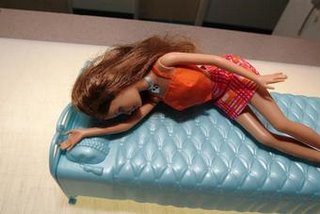
Pro-Anorexia ‘cult’ is becoming popular among North American women
“Oh my god you guys, I totally had more than 300 calories today. That is SO not sexy!” Pink says in her new music video, Stupid Girls, mocking the mindset that, sadly, many young women today have adopted.
It has become widely known over the years that anorexia and bulimia are closely tied to psychological issues, but that’s old news.
Pro-Ana and Pro-Mia are terms that self-identified anorexics and bulimics have given themselves after recognizing that there are numerous women and men who are in support of this lifestyle. The Internet has played a major part in the development of this network.
Those suffering from these diseases have led the Pro-Ana and Pro-Mia movement under the notion that anorexia nervosa and bulimia are a lifestyle choice, rather than a serious medical condition. Some even tout it as being a superior way of living.
In a generation where health education is more accessible than ever before, these sites are in contradiction to common health sense. Many Pro-Ana and Pro-Mia websites offer “thinspiration,” support for anorexics, and tips such as how to hide the disorder, dental maintenance, how to binge, purge, or just how to be a “better anorexic.”
Many of these websites offer photo galleries with pictures of models or other thin women, accompanied by captions such as “If you want to see food, just look at your thighs,” or, “A minute on the lips, forever on the hips.” Some websites offer diet plans for anorexics and have rating systems to decide whether participants are “good anorexics” or “anorexic enough.”
The following is a typical day’s worth of food taken from a www.livejournal.com discussion board:
Breakfast: 1 slice of reduced-calorie bread
1 cup of tea w/ low-calorie sweetener
Lunch: 1 med-large apple
Dinner: 8 baby carrots
Total: 200 calories, 1 gram of fat
Many of the women who consider themselves Ana, meaning anorexic, or Mia, meaning bulimic, receive online support from other sufferers for continuing their dangerous cycle on these Pro-Ana or Pro-Mia discussion boards. The National Eating Disorder Awareness Clinic (NEDIC) reports that most of the administrators of these sites are teenage girls with eating disorders, some as young as 12 years old.
A recent post by a young woman on a Pro-Ana discussion site read: “I took 6 laxatives yesterday morning, 4 more later on in the evening and then another 2 at about 1 o’clock this morning. I took 4 water balance pills yesterday and I’m gonna take more today. I didn’t eat anything else after my binge, so today I’m feeling pretty good.”
These websites promote dangerous eating habits that can be potentially deadly. Health Canada reports that over a 20-year period, one in five people with anorexia and one in 20 people with bulimia will die. Ninety percent of these deaths are women and girls.
The Pro-Ana and Pro-Mia movement has caught on almost like a trend, with Pro-disorder fashion apparel now available. Colour coded bracelets have become popular among sufferers: red bracelets for anorexia, purple for bulimia, black for depression and green for bingeing.
Searches for Pro-Ana and Pro-Mia websites often yield many of the same results, including “The Ten Thin Commandments:”
1) If you aren’t thin, then you aren’t attractive.
2) Being thin is more important than being healthy.
3) You must buy clothes, cut your hair, take laxatives, starve yourself, do anything to make yourself look thinner.
4) Thou shall not eat without feeling guilty.
5) Thou shall not eat fattening food without punishing oneself afterward.
6) Thou shall count calories and restrict intake accordingly.
7) What the scale says is the most important thing.
8) Losing weight is good; gaining weight is bad.
9) You can never be too thin.
10) Being thin and not eating are signs of true willpower and success.
Many Web servers are in the process of shutting down these Web sites as they prove offensive and unhealthy to so many young women. Yahoo! pulled the plug on Pro-Ana and Pro-Mia sites, citing that they violated user agreements to post “no harmful, threatening or abusive material.”
Many Web sites are now out of operation; others have changed servers, URL’s, or added password protection and gone further undercover. The majority of people see this as a positive move; yet health officials fear that the disappearance of these sites may force the issue further underground.
The only visible benefit this movement provides is insight into the lives of those suffering the disorders, so doctors and health officials are better educated on how to help.
If you know anyone you believe to be struggling with one of these eating disorders, the Canadian Health Network suggests taking the following measures:
· Talk to them and find out what’s going on
· Tell them you care and worry about him or her
· Encourage them to speak to a parent, trusted adult or doctor
· Avoid making comments like, “You will look better if you eat” or “You look better since you’ve gained weight.”
· Be supportive
· Encourage them to see a doctor, nurse, counsellor or dietician
· Help them find an eating disorder clinic or support network

0 Comments:
Post a Comment
<< Home